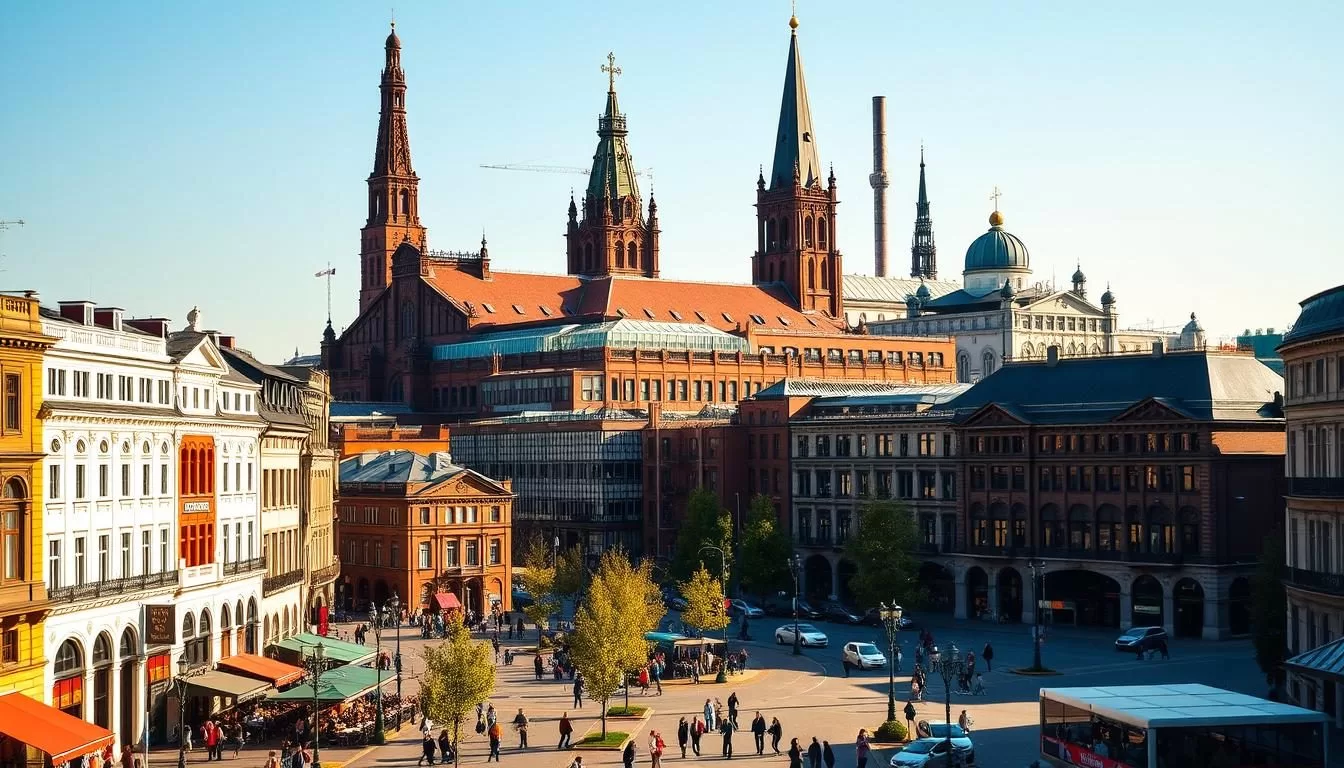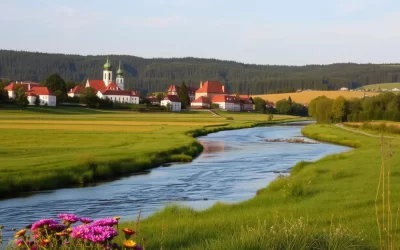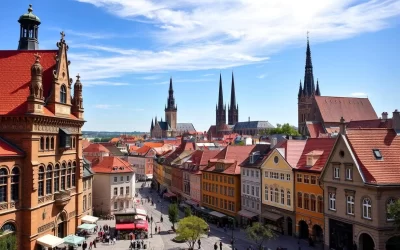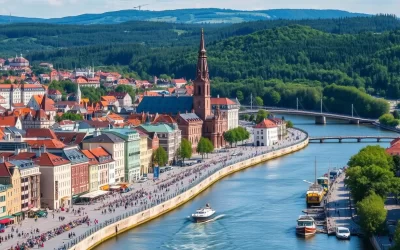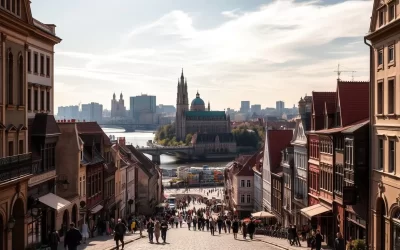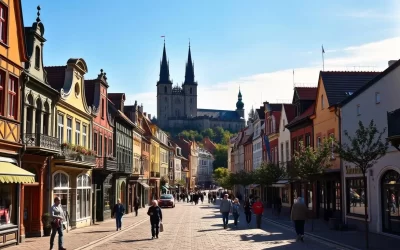Are you ready to explore one of Poland’s most fascinating cities? Let’s start with the basics: the name. “Łódź” is pronounced “wooj,” a unique blend of sounds that might take some practice for non-Polish speakers to get right. The city’s name is just the beginning of its charm.
Imagine a place where history meets modern attractions, where former industrial buildings now house vibrant cultural scenes. That’s Łódź, a hidden gem waiting to be discovered. As you plan your trip, you’ll find that this city’s character shines through its red-brick factories, street art, and culinary delights.
You’ll soon understand why Łódź is a time-worthy destination, beloved by those who venture there. Get ready to uncover the things that make Łódź special, and start planning your visit to this captivating city.
Discovering Łódź: Poland’s Revitalized Industrial Gem
From industrial roots to cultural hotspot, Łódź is a city that has evolved with time. Once a thriving industrial center, it has reinvented itself as a must-visit destination in Poland.

How to Pronounce Łódź
The name “Łódź” is pronounced as “woodge.” The city’s name, meaning “boat,” remains a mystery, as Łódź has no significant connection to water.
A Brief History of Łódź’s Industrial Past
Łódź experienced a colossal industrial boom between 1870 and 1890, driven by textile magnates like Izrael Poznański and Karol Scheibler. This period transformed Łódź into one of Poland’s largest cities, earning it nicknames like “the Manchester of Poland.”
Getting to Łódź
You can reach Łódź via direct flights with airlines like Ryanair and Wizzair or by train from major Polish cities like Warsaw, Krakow, and Gdańsk.
Best Time to Visit
The best time to visit Łódź is during late spring and early autumn, when the weather is pleasant, making it ideal to explore this revitalized industrial gem. Understanding the history and industry that shaped Łódź enhances your visit, as you walk through the city’s unique architectural landscape and visit significant sites like the Jewish cemetery.
Stroll Down Piotrkowska Street: The Heart of Łódź
Piotrkowska Street is more than just a thoroughfare; it’s the pulsating heart of Łódź, inviting you to explore its many wonders. As the city’s main artery, this 4.2 km pedestrian boulevard is a gathering place for both locals and visitors, offering a unique experience that encapsulates the essence of Łódź.
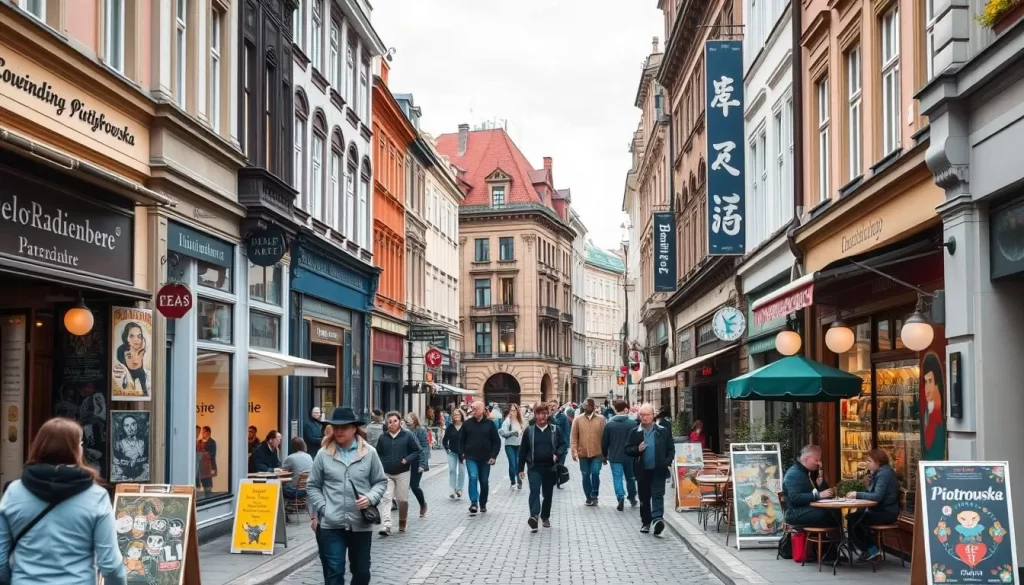
Rose Passage and Hidden Courtyards
One of the standout attractions on Piotrkowska Street is the Rose Passage, a captivating installation at Piotrkowska 3. Thousands of mirror fragments are arranged in the shape of roses, creating a dazzling display of light and reflection. Beyond this, the street is lined with hidden courtyards, each revealing surprising treasures, from artistic installations to charming cafés, making your trip a journey of constant discovery.
Street Art and Sculptures
Piotrkowska Street is a haven for lovers of street art, with vibrant murals and sculptures adorning the buildings and pavements. The Alley of Stars, featuring plaques dedicated to famous Polish film personalities, is a highlight, alongside the quirky Unicorn Stable and Statue at the northern end of the street. This blend of art and culture adds to the street’s unique charm.
OFF Piotrkowska: A Cultural Hub
At Piotrkowska 138/140, the OFF Piotrkowska Center is a former cotton mill turned hip cultural hub. This complex is filled with restaurants, bars, boutiques, and creative spaces, showcasing the city’s alternative side and offering a glimpse into Łódź’s thriving cultural scene.
Best Restaurants and Bars on Piotrkowska
The culinary scene on Piotrkowska Street is diverse and vibrant, with numerous restaurants and bars offering everything from traditional Polish cuisine to international fare. Whether you’re in the mood for something elegant, casual, or quirky, you’ll find the perfect spot to enjoy a meal or a drink, making your visit to Łódź even more memorable.
Explore Manufaktura: From Factory to Entertainment Complex
In the heart of Łódź lies Manufaktura, a massive complex that has evolved from a 19th-century factory into a modern entertainment hub. This sprawling site, once Izrael Poznański’s textile factory, has been transformed into a vibrant center of shopping, dining, and entertainment.

Shopping and Dining Options
Manufaktura boasts an impressive array of shopping and dining options. With over 300 shops and boutiques, you can find everything from local Polish brands to international fashion labels. The complex is also home to numerous restaurants, cafes, and bars, offering a diverse range of cuisines to suit every taste.
Museum of the Factory
The Museum of the Factory (Muzeum Fabryki) is a must-visit attraction within Manufaktura. This museum showcases the history of Łódź’s textile industry, featuring working looms and machinery that once powered the city’s economy. You can gain a deeper understanding of the city’s industrial past and its significance in the region.
Seasonal Activities and Events
Manufaktura is a year-round destination, with seasonal attractions that cater to all ages. In the summer, enjoy the sand-filled beach area with volleyball courts, while in the winter, ice skate at the outdoor rink. The complex also hosts various festivals and events throughout the year, ensuring that there’s always something new to experience.
MS2 Museum of Art
Art enthusiasts will appreciate the MS2 Museum of Art, located within Manufaktura. The museum features an impressive collection of modern and contemporary art, including works by Polish and international artists. You can explore the latest exhibitions and enjoy the unique blend of art and industrial heritage.
Manufaktura represents a successful model of urban renewal, transforming a former industrial site into a thriving social hub. As you explore this complex, you’ll discover a unique blend of history, culture, and entertainment that makes Łódź a fascinating destination.
Visit Historic Palaces: Glimpses into Łódź’s Wealthy Past
Step into the opulent world of Łódź’s textile magnates by visiting its historic palaces. These grand structures not only reflect the city’s industrial legacy but also showcase the wealth and influence of its 19th-century elite.
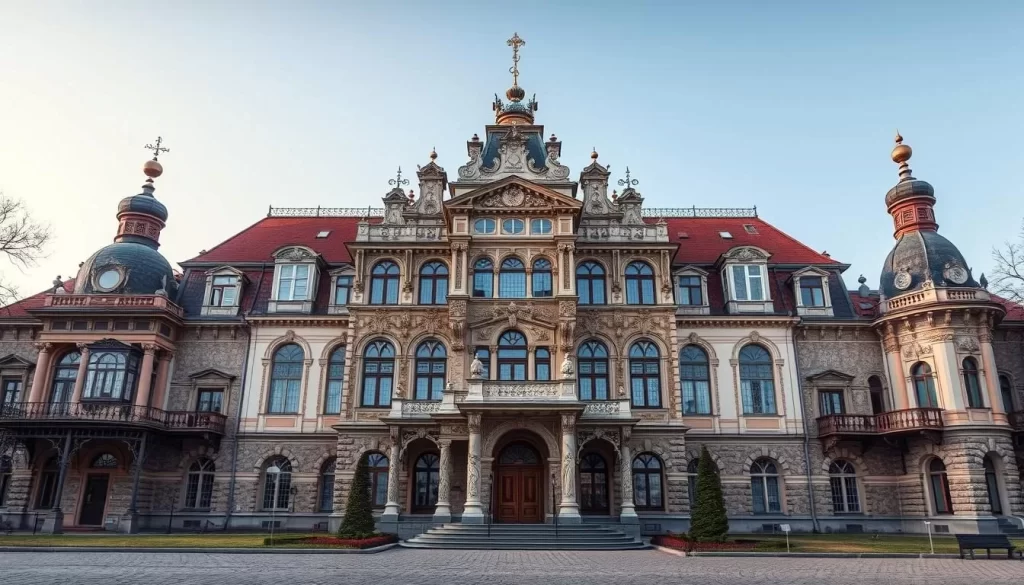
Izrael Poznański’s Palace (Museum of Lodz)
Izrael Poznański’s palace is a masterpiece of 19th-century architecture, conveniently located near the Manufaktura complex. This opulent residence, now the Museum of Łódź, boasts an eclectic mix of Neo-Renaissance, Neo-Baroque, and Neo-Rococo styles, reflecting Poznański’s immense wealth and status. Inside, the palace is equally breathtaking, with lavish decorations including stuccoes, frescoes, and stained glass.
Herbst Palace Museum
The Herbst Palace is another architectural jewel, built for Matylda Scheibler and her husband Edward Herbst in the late 19th century. This elegant residence offers a glimpse into the lifestyle of Łódź’s industrial elite, with its original furnishings and art collection. The palace underwent significant restoration in 1976 and now serves as a museum, allowing visitors to explore its lavishly decorated rooms.
Scheibler’s Palace
Scheibler’s Palace, now home to the Film Museum, is a magnificent residence that combines Gothic and Renaissance elements. This palace houses fascinating exhibitions on Polish cinema, making it an essential stop for cultural trips to Łódź. Visitors can explore the palace’s grandeur and learn about its history.
Visiting these historic palaces provides a unique glimpse into Łódź’s wealthy past, showcasing the city’s rich history and architectural grandeur. Additionally, a visit to the nearby Jewish cemetery, one of the largest in Europe, offers further insight into the lives of Łódź’s industrial magnates and their families.
Discover Księży Młyn: The Priest’s Mill District
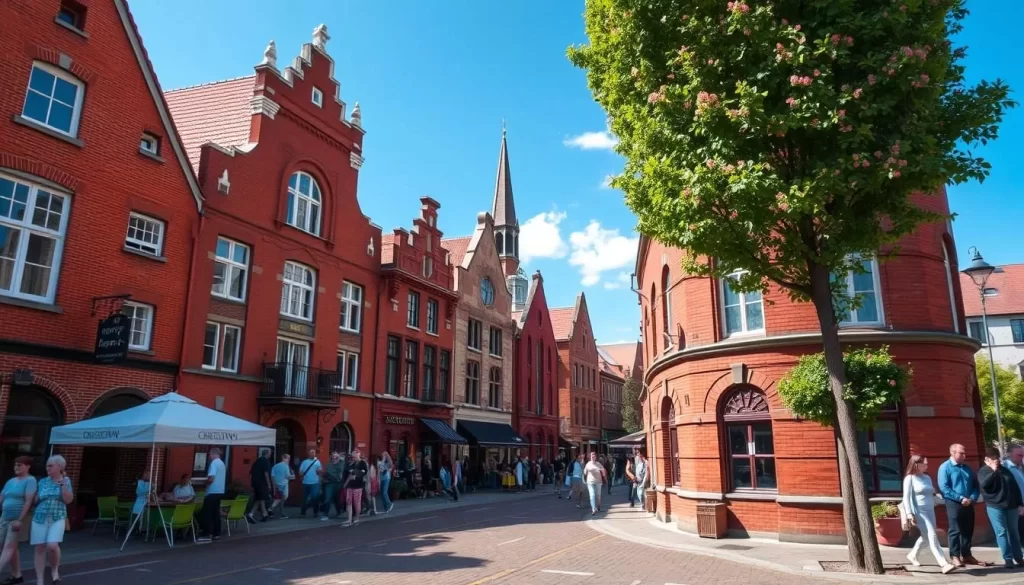
In the heart of Łódź, you’ll discover Księży Młyn, a testament to the city’s industrial past and present creativity. This historic district, known as Priest’s Mill, was developed in the 1850s by Karol Scheibler, one of Łódź’s most prominent industrialists. Under his vision, Księży Młyn became a self-sufficient community, housing not just factories, but also workers’ apartments, schools, a hospital, and a fire station, creating a unique industrial ecosystem.
Architecture and Industrial Heritage
The architecture of Księży Młyn is characterized by its distinctive red brick buildings, which once served as the backbone of the textile industry. As you wander through the complex, you’ll notice the blend of industrial and residential spaces, a testament to the area’s historical significance. The complex has been thoughtfully revitalized over the years, preserving its original character while adapting to modern needs. Today, Księży Młyn stands as a vibrant district, attracting both locals and tourists alike.
Film Locations and Cultural Significance
Księży Młyn has gained fame not just for its industrial heritage but also as a popular film location. Many Polish and international productions have chosen its atmospheric settings as a backdrop, adding to its cultural significance. As you explore the maze of red brick buildings, you can spot locations from various films, making it a unique experience for film enthusiasts and visitors.
Cafés and Art Spaces
Today, Księży Młyn is a hub for artists, entrepreneurs, and cultural enthusiasts. The district is dotted with galleries, cafés, restaurants, and event spaces, offering a blend of creativity and community. You can enjoy a coffee in one of the many cafés, explore local art exhibitions, or simply soak in the vibrant atmosphere of this living museum. Some residential blocks still house people, adding to the district’s charm and character.
Experience Łódź, Poland: Best Things to Do – Top Picks for Film Enthusiasts
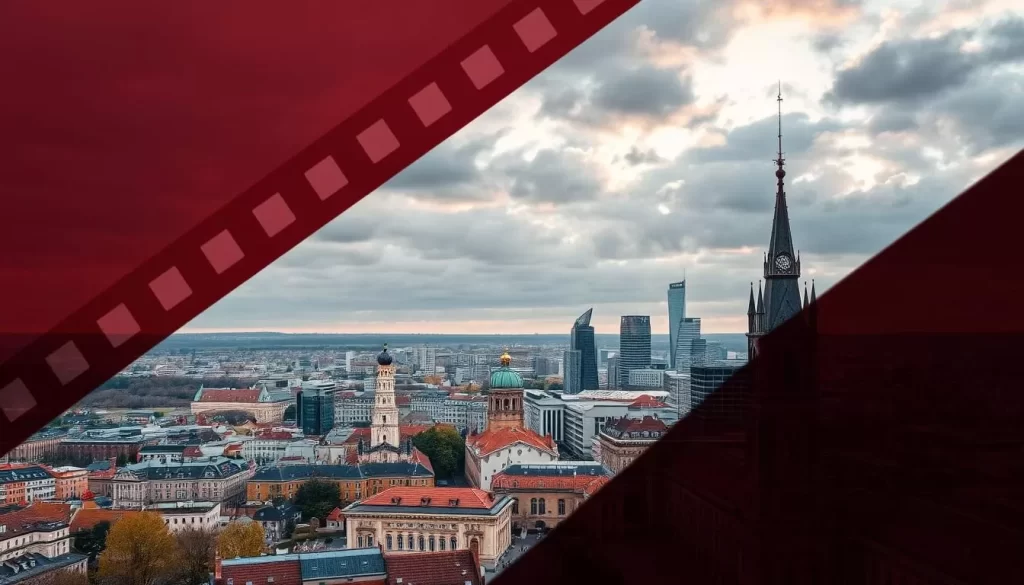
For film enthusiasts, Łódź is more than just a city; it’s a treasure trove of cinematic history and heritage. Known affectionately as ‘HollyŁódź,’ this Polish city boasts one of the world’s oldest and most prestigious film schools, having nurtured talents like Roman Polanski and Krzysztof Kieślowski.
Lodz Film School Legacy
The Łódź Film School (Państwowa Wyższa Szkoła Filmowa, Telewizyjna i Teatralna) is a legendary institution that has shaped generations of influential filmmakers. Although the school itself isn’t open to the public, its legacy is palpable throughout the city, making it a significant part of Łódź’s identity.
Film Museum and Memorabilia
The Film Museum, housed in the lavish Scheibler’s Palace, offers an immersive insight into the evolution of filmmaking. With exhibits that include early cinematic devices, historical archives, and fascinating film memorabilia, it’s a must-visit for anyone interested in the history of cinema.
Alley of the Stars
Łódź’s ‘walk of fame,’ the Alley of the Stars (Aleja Gwiazd), is modeled after its Hollywood counterpart and features over 60 bronze stars dedicated to famous Polish actors, directors, and cinematographers. Strolling down this alley on Piotrkowska Street is a great way to experience the city’s rich cinematic heritage.
Łódź’s film attractions don’t stop there. The city’s distinctive architecture and atmospheric industrial spaces have made it a popular filming location for numerous Polish and international productions. As you explore Łódź, you’ll discover why it has become a vibrant cultural hub, attracting creative people from across Poland and beyond.
Explore Revitalized Industrial Spaces
The industrial landscape of Łódź has undergone a significant transformation, turning former factories into centers of culture, science, and entertainment. As you explore these revitalized spaces, you’ll discover how the city’s industrial heritage has been repurposed into vibrant hubs that are now a hallmark of its identity.
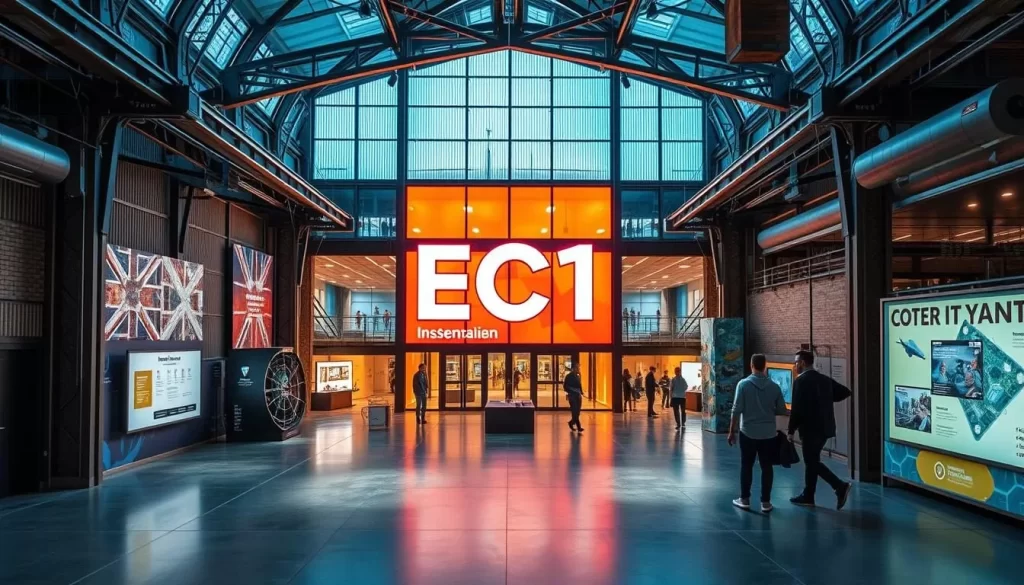
EC1: Science and Technology Center
EC1, formerly a prominent power plant, is now a cutting-edge Science and Technology Center. This complex houses amazing exhibitions and installations, including “The Street of Elements” and a planetarium, one of the most advanced in Europe. Visitors of all ages can enjoy interactive displays that make complex scientific concepts accessible and fun.
Monopolis: From Vodka Factory to Cultural Center
Monopolis, the third largest industrial complex in Łódź, was once a state-owned vodka factory. After its closure in 2017, it underwent a significant revitalization project. Today, it’s a vibrant complex featuring restaurants, offices, art galleries, and a museum showcasing the history of vodka production. The area is beautifully decorated with plenty of greenery, making it a pleasant spot to spend a few hours.
Central Museum of Textiles
The Central Museum of Textiles is located in the White Factory, one of the oldest textile industry buildings in Łódź. The museum features working looms and comprehensive exhibitions on textile manufacturing techniques, offering a glimpse into the city’s industrial past. It’s a significant part of Łódź’s story, showcasing its transformation from a manufacturing powerhouse to a cultural center.
Conclusion: Why Łódź Deserves a Spot on Your Polish Itinerary
Łódź, often referred to as the Manchester of Poland, is a hidden gem waiting to be discovered. As you’ve explored throughout this article, Łódź offers a unique blend of industrial heritage and contemporary culture, making it an exciting city to visit.
You can appreciate how Łódź has transformed its industrial past into a vibrant present, with former factory complexes now housing museums, art galleries, shopping centers, and entertainment venues. This transformation gives Łódź its distinctive character, setting it apart from other cities in Poland.
Visiting Łódź allows you to experience the authentic charm of a place that is still off the beaten path for many tourists. You can enjoy high-quality restaurants and bars at prices that are often significantly lower than in Western Europe, making it an excellent value for your trips.
With its rich history, vibrant street art, magnificent palaces, historic jewish cemetery, and thriving film culture, Łódź is a city that will leave you with unforgettable memories. Whether you’re planning a standalone city break or adding it to a longer Polish itinerary, Łódź is easily accessible by direct flights or train from major Polish cities, making it a perfect place to explore.
